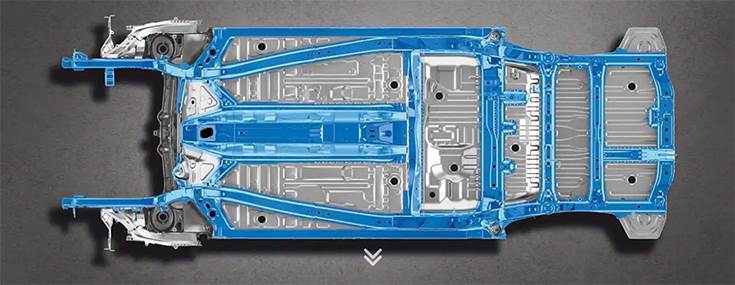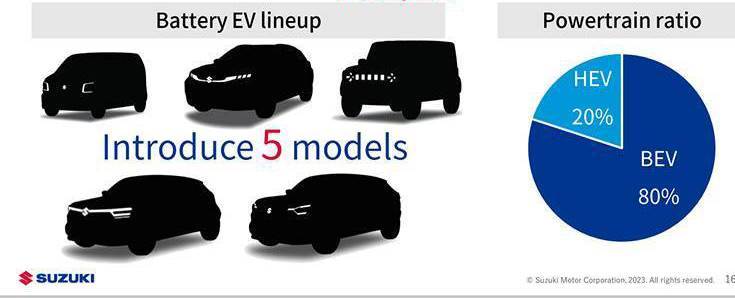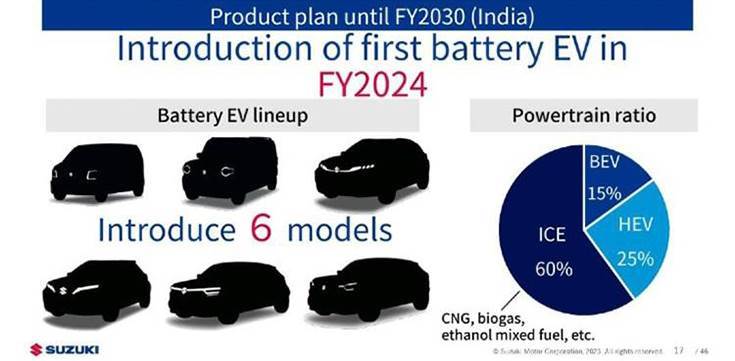Suzuki Motor Corporation has announced its technology strategy for the next decade. As per the company statement, the Japanese automaker will realise a “technology that minimizes energy consumption” from manufacturing to recycling, and aim for a carbon-neutral world while providing the joy of transportation to people all over the world.
SMC has a five-pronged tech strategy, as detailed under.
Lightweighting: Suzuki, which is known for its expertise in manufacturing compact and light passenger vehicles, plans to further evolve its Heartect lightweight and safety platform. The Heartect platform has rigid structural elements that ensure occupant protection while designated crumple zones ensure impact energy is dissipated and absorbed, ensuring all occupants remain safe.

The platform has also been rigorously tested and validated for the frontal offset crash, side impact crash and passenger protection under various conditions, which makes it an important part of a car’s safety quotient. The Heartect platform underpins a number of Maruti Suzuki passenger vehicles currently sold in India.
Lightweighting in vehicles not only helps reduce CO2 emissions during use, but also reduce the resources and CO2 emissions in production, thus contributing to resource conservation and CO2 reduction.
Lean-battery BEVs and HEVs: In early 2023, Suzuki had outlined an ambitious growth strategy which includes a £3 billion investment in battery development, introduction of five new electric cars from 2024 onwards and a pledge to achieve carbon neutrality in Europe by 2050.

In its latest tech update specific to Battery Electric Vehicles (BEVs) and Hybrid Electric Vehicles (HEVs), SMC has said that it aims “to provide our customers with the most energy-efficient electric vehicles based on the renewal energy ratio and usage conditions in each country and region. Suzuki will be developing EVs that minimise energy consumption by combining components that embody ‘Sho-Sho-Kei-Tan-Bi’ such as a small and efficient electric unit, and a small and light battery.”
High-efficiency ICE/CNF (Carbon Neutral Fuel) technology: In 2023, SMC developed a high-efficiency engine (the Z12E engine) that pursues improved combustion, which is the core of internal combustion engines, and achieved a maximum thermal efficiency of 40%. In the future, we will extend this high-efficiency engine worldwide and achieve to minimize energy consumption by carbon-neutral fuel and next-generation hybrids.
SDV right: To maximise gains in the megatrend of software defined vehicles (SDV), Suzuki will be developing what it calls ‘SDV right’, an affordable system that creates value for vehicles by embodying minimization of energy consumption with ‘Sho-Sho-Kei-Tan-Bi’. This translates into ease of software updates for user, with the best mix of wired and wireless over-the-air (OTA) updates.
Easy recyclability and disassembly design: The conventional economic system is called a linear economy, which the flow of raw material extraction, product manufacturing, utilization, and disposal is unidirectional. This has caused mass consumption of energy, resource depletion and environmental destruction.
In the future, Suzuki will achieve minimal energy consumption with the circular economy which is to save the total use of resources by designing products that can be easily disassembled with recycling and reuse in mind.
In January 2023, SMC had announced its future growth 2030 strategy aimed at realization of a carbon-neutral society and the economic growth of emerging countries such as India, ASEAN, and Africa, with its main business regions, Japan, India, and Europe, as the core.

India, which is SMC’s largest global market, has been earmarked to see the launch of six BEVs by FY2030. To provide a full range of products and services, Suzuki will provide not only battery EVs but also carbon neutral internal combustion engine vehicles that use CNG, biogas, and ethanol mixed fuels.
